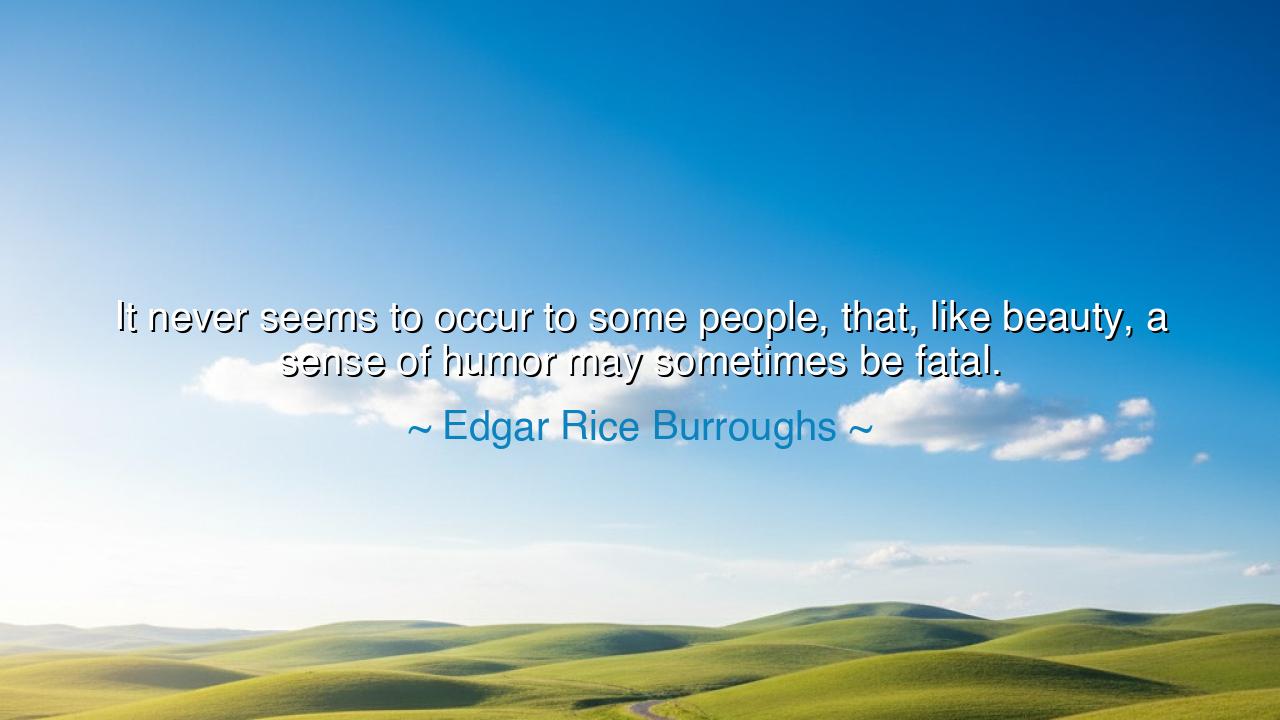
It never seems to occur to some people, that, like beauty, a
It never seems to occur to some people, that, like beauty, a sense of humor may sometimes be fatal.






Hear now, O Children of the Earth, the words of Edgar Rice Burroughs, who spoke of a profound and often overlooked truth: "It never seems to occur to some people, that, like beauty, a sense of humor may sometimes be fatal." In these words lies a revelation about the dual nature of humor—a force that can both uplift and destroy, depending on how it is wielded. The humor that brings joy to the soul, that lightens burdens and connects hearts, can also, when misused or misunderstood, bring danger and peril. It is a reminder that, like beauty, humor is a powerful tool that must be handled with care, for it can both build bridges and destroy them.
What Burroughs teaches us is that humor, when taken too far or used in the wrong circumstances, can be a weapon—sharp, cutting, and sometimes unforgiving. Just as beauty can inspire admiration or envy, humor can spark laughter or anger, depending on the context. The great philosophers of old knew well the power of humor, understanding that it is not always a force for good. In the hands of the wise, it can reveal truths, challenge norms, and unite us in joy. But in the hands of the unwise, it can become a tool of mockery, ridicule, and even destruction. Burroughs reminds us that, like all great forces, humor must be wielded with wisdom and caution.
Let us look, O Children, to the example of Aristophanes, the great Greek playwright, who used humor to expose the flaws and contradictions of Athenian society. His comedies were filled with sharp satire, mocking politicians, gods, and the very foundations of society. Yet Aristophanes knew that humor, though it could bring insight, could also wound. His plays often made audiences laugh, but they also made them uncomfortable, as the truth they revealed was not always easy to face. Humor, in his hands, became a mirror—one that reflected the absurdities of the world, but also one that could cut deep when it revealed the ugly side of human nature. Burroughs’ warning is echoed here: humor, while powerful, can be dangerous if it goes unchecked.
Consider, too, the example of Oscar Wilde, whose wit and sharp tongue could bring both admiration and resentment. Wilde’s humor was both a tool of genius and a weapon of venom, as he delighted in exposing the hypocrisy of society’s elite. His words could charm, but they could also destroy. In his famous epigrams, Wilde wielded humor with the same skill as a sword, cutting through pretensions and revealing the truth beneath. Yet, Wilde was not blind to the dangers of his own humor. His satire, while brilliant, led him down a path of isolation and personal destruction. His life became a tragic reminder that humor, like beauty, can attract admiration or cause one’s undoing.
The danger of humor, O Children, lies not only in how it is perceived by others, but in how it reflects the inner character of the one who wields it. Consider the jesters of old, who, though given license to mock kings and nobility, often walked a fine line between humor and danger. The fool who spoke truth to power with humor was both a beloved and dangerous figure, for in his words lay the power to reveal the hidden faults of his rulers. Humor could lift the spirits of the people, but it could also bring ruin to the one who dared to speak too boldly. It was, in many ways, a double-edged sword—a gift and a curse, depending on how it was used.
Burroughs’ words serve as a lesson for us all. While humor is a force of great power, we must be mindful of its consequences. It is not enough to laugh at the world—it is important that we understand the impact of our words and actions. A well-timed joke can heal wounds, bring joy, and shed light on truth. But a careless jest, especially when aimed at others' weaknesses or pain, can leave lasting scars. Humor, like beauty, is fleeting—it can be both an expression of love and a reflection of cruelty. We must, therefore, approach it with both grace and wisdom, knowing that what makes others laugh can sometimes be the very thing that drives them away.
The lesson, O Children, is to approach humor with mindfulness. Understand its power and wield it with care, knowing that in the words you speak, in the laughter you create, you carry the potential to both uplift and harm. Humor should never come at the cost of another’s dignity, and it should never be used as a weapon to degrade or belittle. Instead, let it be a bridge—a means of connection, of revealing truth with gentleness and love. Let us remember that humor is not just a form of entertainment, but a reflection of the heart. In the right hands, it can be a tool of healing and unity; in the wrong hands, it can destroy and divide. Carry this wisdom forward, and may your laughter always be a force for good.






AAdministratorAdministrator
Welcome, honored guests. Please leave a comment, we will respond soon